Key takeaways:
- CBD has gained popularity for its potential therapeutic benefits, including pain relief and anxiety management, but individual responses vary, necessitating careful experimentation.
- International CBD laws are inconsistent, with varying regulations across regions, impacting both consumer access and business operations; countries like Canada offer clearer frameworks compared to the fragmented landscape in the U.S. and Europe.
- The future of CBD legislation may trend towards harmonization and unified standards, driven by consumer advocacy and technological innovations like blockchain for compliance tracking.

Understanding CBD and Its Uses
CBD, or cannabidiol, is a compound derived from the hemp plant that’s gained significant attention for its potential therapeutic effects. I remember the first time I tried CBD oil; I was skeptical but curious. After all, could something from a plant really help with anxiety? To my surprise, I found it did provide some relief, and that experience opened my eyes to the various forms of CBD available, from oils and tinctures to edibles and topicals.
Many people are turning to CBD for a wide range of uses, including pain relief, anxiety management, and even as a sleep aid. Sometimes, it feels like a modern remedy for age-old problems, doesn’t it? I’ve spoken to friends who use CBD to ease their chronic pain, and they rave about how it allows them to enjoy life again. It’s fascinating to see how this compound has sparked a new wave of discussion about alternative therapies and holistic wellness.
Of course, I’ve also encountered those who view CBD with skepticism. Some wonder: is it truly effective or just another trend? From my perspective, the key lies in understanding that everyone’s body chemistry is different. What works wonders for one person may not have the same effect on another. This variability makes it essential for users to experiment wisely, seeking support from qualified professionals if they’re unsure.
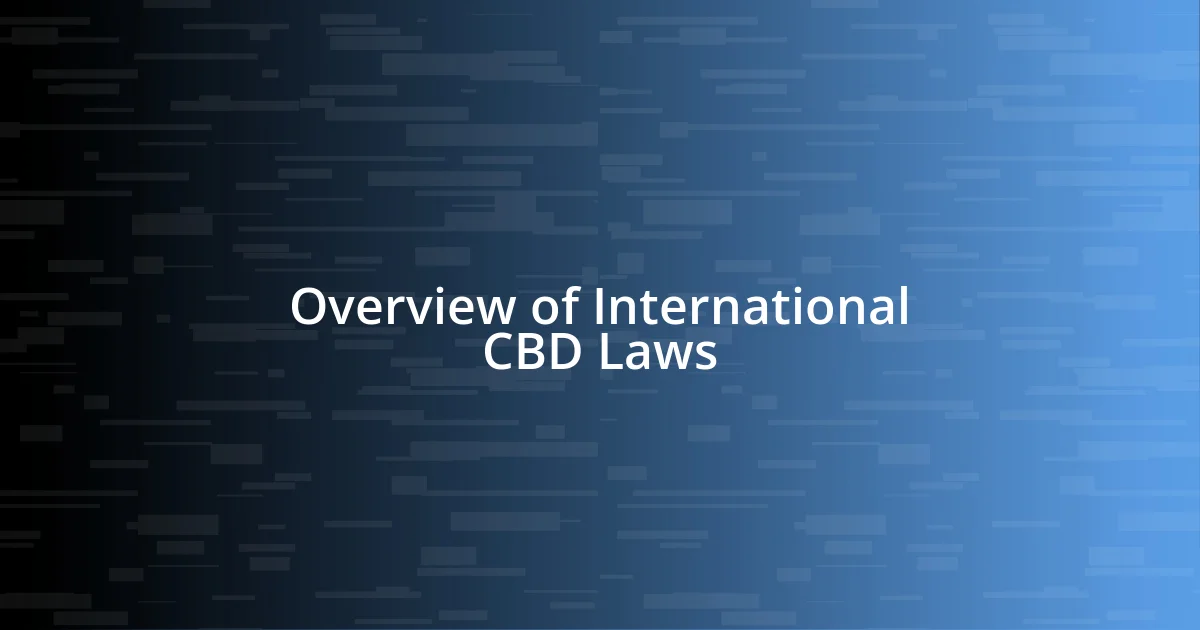
Overview of International CBD Laws
Understanding the landscape of international CBD laws is crucial for anyone interested in this evolving industry. My interactions with friends from different countries who use CBD has unveiled a patchwork of regulations. It’s intriguing yet confusing to see how some nations embrace it while others impose strict bans.
To give you a clearer picture, here’s a snapshot of the CBD regulatory landscape around the world:
- United States: CBD from hemp is federally legal, but states have their own regulations. This leads to a mixed bag of legality across the country.
- Canada: CBD is legal and regulated under the Cannabis Act, making it accessible for recreational and medicinal use.
- European Union: The legality varies by country, but CBD derived from industrial hemp is generally legal, provided it contains less than 0.2% THC.
- Australia: CBD is available but requires a prescription for medicinal use. Legal access has improved but remains somewhat limited.
- Asia: Many countries, like Japan, are loosening restrictions, while others, like China, maintain strict bans.
Having family in different parts of Europe, I’ve seen firsthand how inconsistent laws can affect access. My cousin was thrilled when she discovered CBD is available in her country, yet frustrated for her friend who faces legal hurdles for even possessing it elsewhere. The emotional tug-of-war around this topic adds layers to the conversation—it’s not just about legality; it’s about people’s lives and well-being.
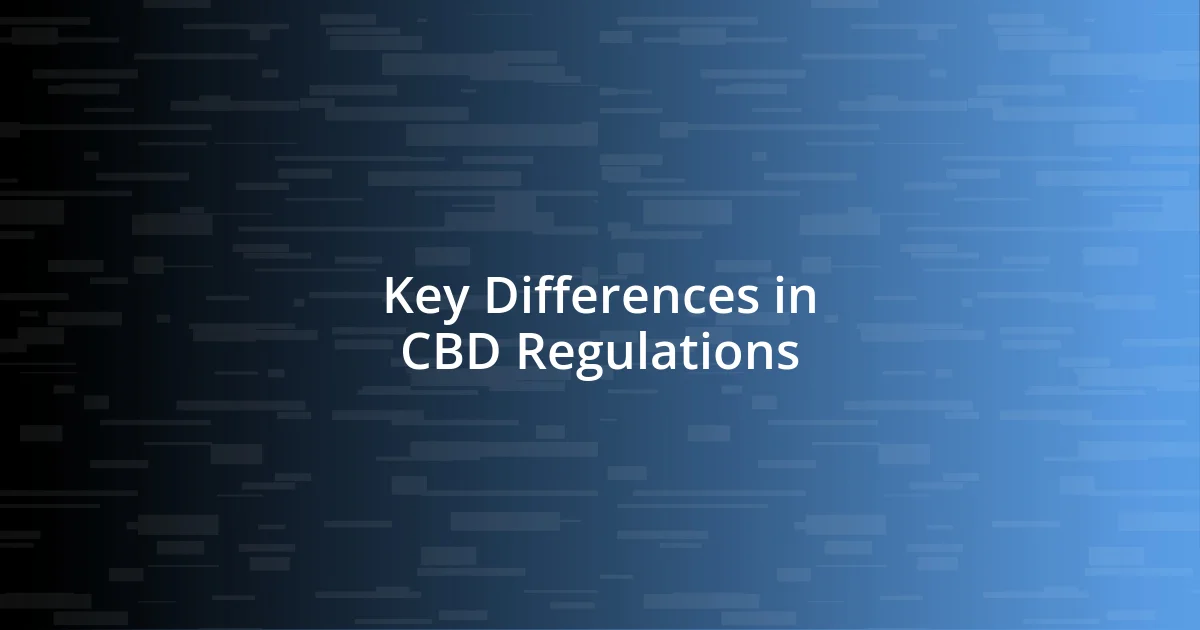
Key Differences in CBD Regulations
Understanding the key differences in CBD regulations across the globe can feel like navigating a maze. For instance, while CBD from hemp is legal in the United States, individual states can impose their own restrictions, often leading to confusion among consumers. I remember chatting with a friend who moved from California, where CBD is widely accepted, to Texas, where the regulations caught him off guard. His frustration was palpable as he tried to understand the local rules.
In contrast, countries like Canada have taken a robust approach by fully legalizing CBD under the Cannabis Act, which streamlines the process for users. My aunt in Toronto often shares how relieved she feels knowing she can access CBD products easily without fear of legal repercussions. This consistent regulation not only fosters confidence but also helps establish a vibrant market for CBD products.
When looking at the European Union, however, the discrepancies become evident, with countries allowing CBD but placing focus on the THC content. I found myself in a conversation with a friend traveling in Europe who had to carefully check the THC levels in products she bought while on vacation. The ongoing adjustments in regulations highlight the ever-evolving nature of the CBD landscape, creating an environment that is both exciting and daunting for consumers trying to navigate it.
| Region | Regulation Highlights |
|---|---|
| United States | Legally permitted, but varies by state |
| Canada | Fully legalized and regulated under the Cannabis Act |
| European Union | Generally legal if derived from industrial hemp with <0.2% THC |
| Australia | Requires prescription for medicinal use |
| Asia | Varied laws; some countries easing restrictions, others remain strict |
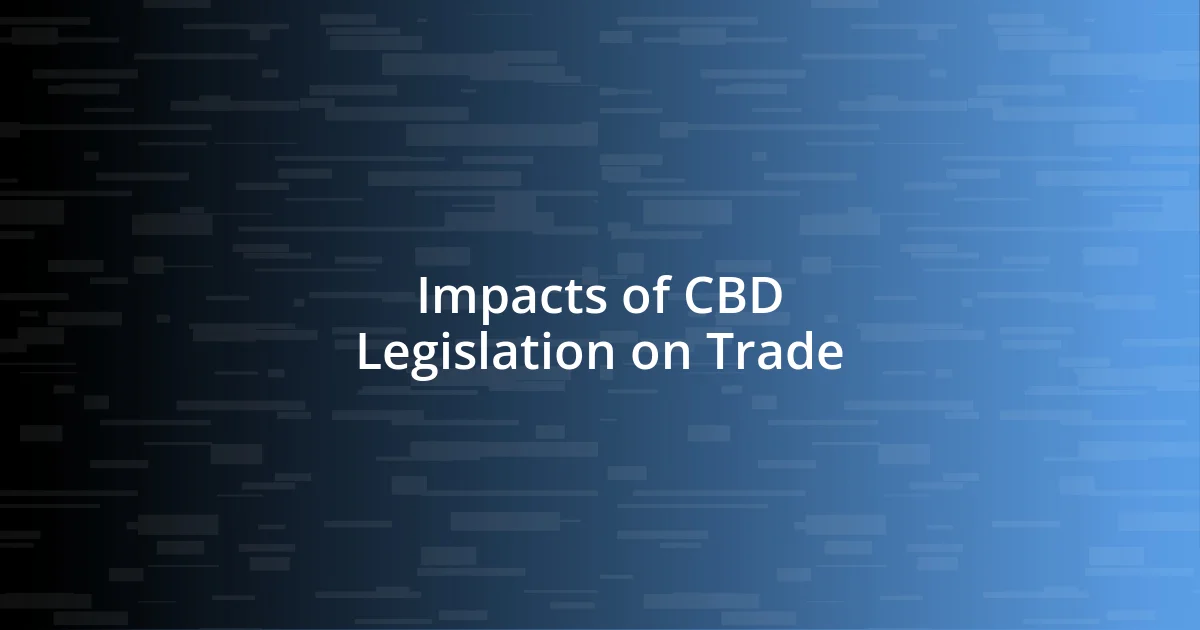
Impacts of CBD Legislation on Trade
The impacts of CBD legislation on trade can be quite profound and complex. In my experience running a small online business focused on natural products, I’ve noticed that inconsistent laws can really stifle growth. For example, when the European Union changed its regulations on hemp-derived CBD, I had to scramble to ensure compliance for products I was planning to export. It’s a constant balancing act that can deter potential investments and partnerships.
On a more emotional note, I often reflect on how these regulations influence livelihoods. A friend of mine who farms industrial hemp shares how the murky legal waters have forced him to pivot between products just to stay afloat. It’s frustrating for him—and for many small farmers—because they see the potential of the CBD market, but hesitations surrounding legality push them to the sidelines. How can we expect entrepreneurs to innovate when laws are unsteady?
Trade relationships often hinge on clear regulations, and I’ve observed that countries with well-defined legal frameworks for CBD generally see more robust market activity. For instance, Canadian companies have thrived by adhering to the Cannabis Act, making it easier for them to export. Imagine being a startup with amazing products but unable to reach international markets due to ambiguity. It’s a tough reality many entrepreneurs face today, and it underscores the critical need for cohesive and supportive legislation worldwide.

Navigating Compliance in Different Countries
Navigating compliance with CBD laws in different countries is often like trying to solve a complicated puzzle. I remember a time when I had to advise a friend looking to launch a CBD brand internationally. She was excited until I mentioned the potential legal hurdles she might face. Each country had its own set of rules, and failing to comply could mean serious setbacks or hefty fines.
Take Australia, for example. I spoke with an entrepreneur who was eager to tap into the Australian market, only to find that a prescription was necessary for medicinal CBD products. This revelation left him feeling deflated, and it made me wonder—how many budding businesses could be stifled by such strict requirements? It’s a reminder that while innovation thrives on opportunities, it often meets sharp turns when regulations are steep.
Then there’s the experience of navigating Europe’s CBD landscape, where visiting different countries can feel like playing a guessing game. While one country might welcome CBD with open arms, another could impose stringent guidelines. I chatted with a woman who had to change her travel plans after learning that the CBD oil she brought with her violated local laws. Thinking about her experience led me to question—shouldn’t there be simpler, more uniform regulations that empower rather than hinder? This inconsistency can leave consumers and businesses alike feeling anxious and uncertain about the future.
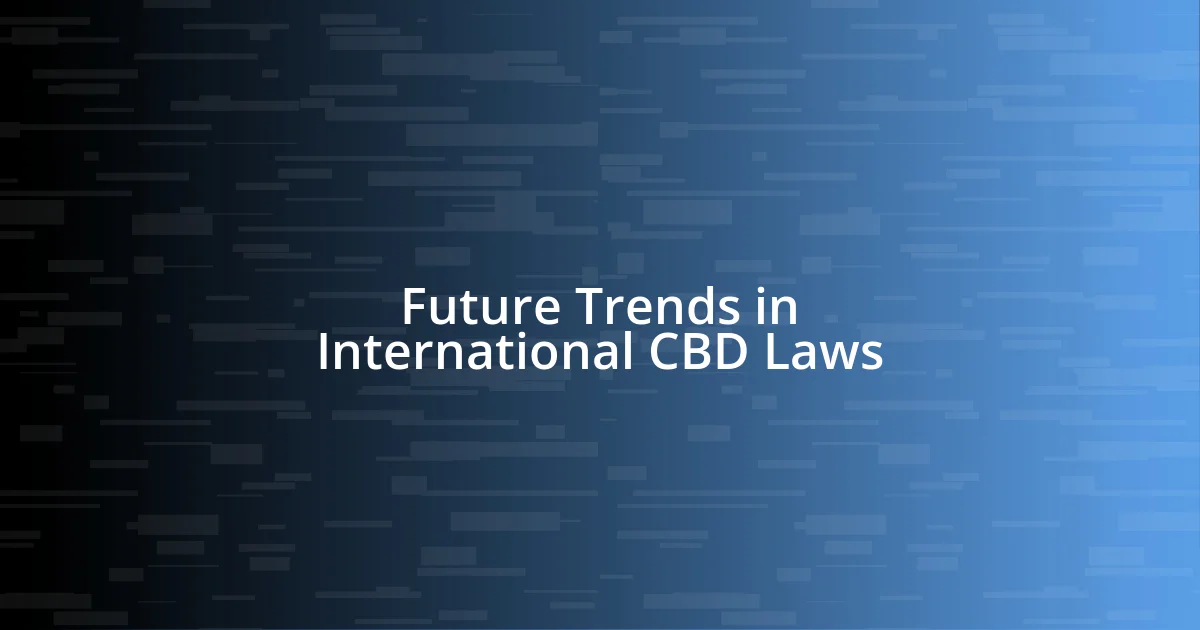
Future Trends in International CBD Laws
The future of international CBD laws is likely to shift toward greater harmonization, reflecting the growing global demand for CBD products. I recall a conversation with a regulatory expert who emphasized that as more countries recognize the benefits of CBD, we may see a move toward unified standards. Wouldn’t it be refreshing to have a set of common guidelines that allow businesses to operate seamlessly across borders?
I anticipate that technology will play a significant role in shaping these laws. For instance, blockchain could be used for transparent tracking of CBD products from seed to sale, ensuring compliance with varying regulations. I’ve seen companies utilize this technology for supply chain management, which not only builds trust but could also pave the way for regulatory acceptance. Could this be the key to unlocking a consistent global market, making it easier for entrepreneurs like myself to thrive?
Moreover, I believe that consumer advocacy will continue to influence lawmakers in different regions. When I participated in a local CBD expo, the energy from consumers advocating for greater access was palpable. Seeing people come together to share their experiences with CBD highlighted how grassroots movements can push for more progressive laws. If governments start listening more to public demands, what new possibilities might emerge for the industry? The conversation about CBD legislation is evolving, and I can’t help but feel optimistic about where it’s headed.
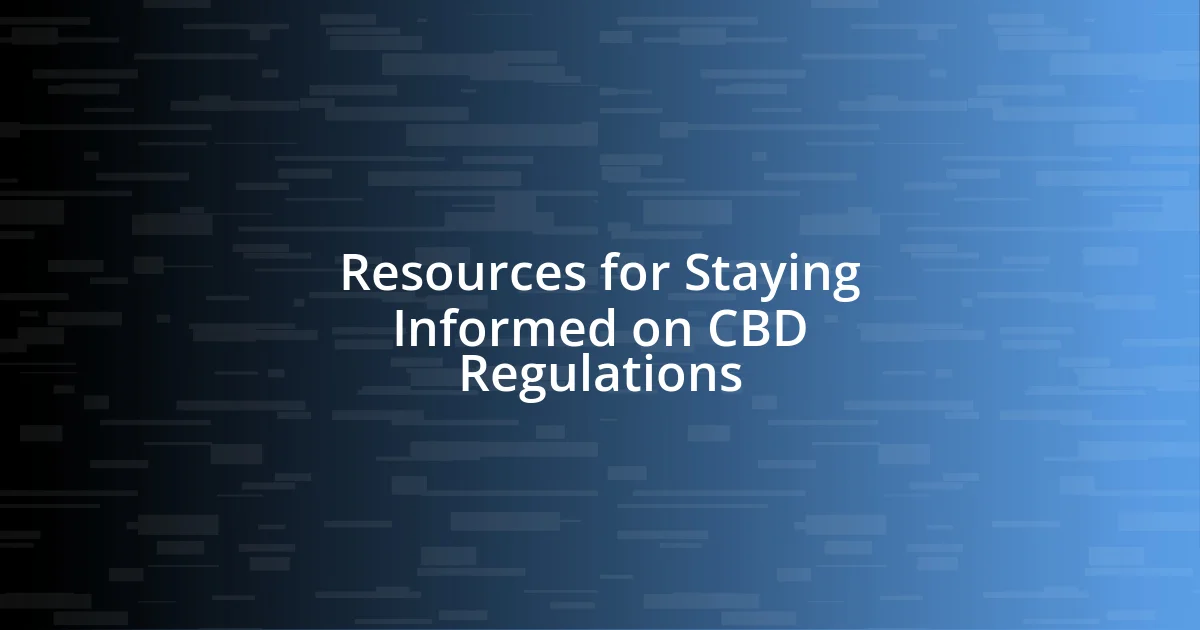
Resources for Staying Informed on CBD Regulations
Staying informed on CBD regulations can feel like a full-time job, but there are some fantastic resources out there. For instance, I often turn to the National Cannabis Industry Association’s website, which provides updates on legislation and regulations across the U.S. It’s essential to look for information tailored to your specific region, as what’s true for one place may not hold for another. Have you ever found yourself lost in a sea of legal jargon? This website breaks things down in a way that’s accessible and straightforward, making it easier for people like me to stay compliant.
Another tool I frequently recommend is the use of social media platforms and forums dedicated to CBD discussions. I’ve joined a few Facebook groups where industry professionals exchange real-time updates about changing regulations. Just last month, someone posted about new developments related to CBD advertising in Canada, which was crucial information for anyone looking to connect with that market. How valuable it is to have a community that shares insights and experiences!
Finally, consider subscribing to newsletters from reputable law firms that specialize in cannabis law. I did this a while back, and it has been a game-changer. These newsletters often provide summaries of important legal updates that could easily slip under the radar. Sometimes, I’ll come across a change that makes me rethink my entire approach to my CBD business strategy. It’s amazing how staying informed can empower us to navigate the complexities in this evolving market.














